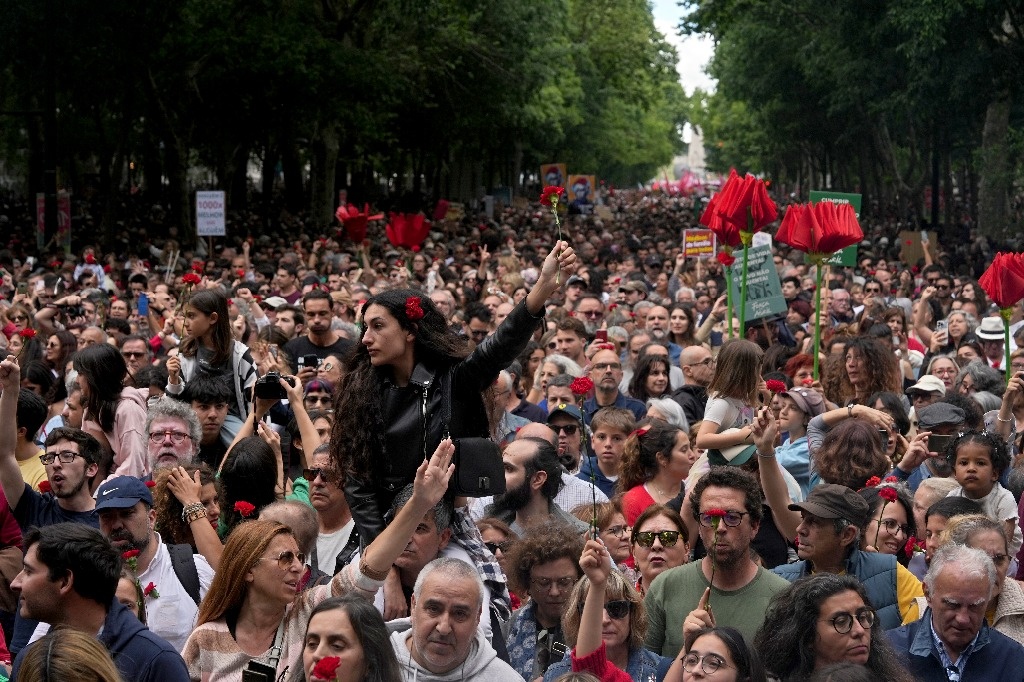Lisboa. Tens of thousands of people celebrated in Lisbon on Thursday the fiftieth anniversary of the Carnation Revolution, a bloodless coup led by young Portuguese officers that ended 48 years of dictatorship and 13 years of colonial wars in Africa.
The traditional popular parade along Liberty Avenue, the culmination of hundreds of initiatives over several weeks, gathered an immense crowd in the afternoon.
“April 25, always! Fascism, never again!” shouted the protesters, with red carnations in their hands or in their buttonholes.
“It is a great joy to be here,” declared Helena Pereira, who was sixteen years old when the uprising took place that changed the history of Portugal.
The regime overthrown in 1974 had been born with a military dictatorship established in 1926. The then Minister of Finance, Antonio Salazar, then led the government — under the motto “God, Country, Family” — between 1932 and 1968, when he was replaced by law professor Marcelo Caetano.
The current celebrations take place in a context of a rise in the extreme right, embodied by the Chega (Enough) party, which in the legislative elections on March 10 became the third political force in the country, with 18% of the votes.
Tiago Farinha, a 28-year-old student, explains that precisely because of “the current political context” he decided to participate this year for the first time in the celebrations of the establishment of democracy.
The young man raises a banner that reads: “God, Country, Family, shit!”
“It is a cry of rebellion, because there are more and more populist forces that support that type of slogan,” he says.
A toxic theme
The day began with a military ceremony in a large square in the center of Lisbon, on the banks of the Tagus estuary, in which military vehicles from the period restored for the occasion participated.
It ended with an event that brought together the Portuguese president, the conservative Marcelo Rebelo de Sousa, and his counterparts from the African countries that became independent after the arrival of democracy: Angola, Mozambique, Guinea Bissau, Cape Verde and Sao Tome and Principe.
Rebelo de Sousa surprised before the commemoration by raising the question of possible colonial reparations.
“We are responsible for what we did there. We have to pay the costs,” he said Tuesday at an informal meeting with the foreign press in Lisbon.
This position faces opposition from the new moderate right-wing government. “It is a toxic” and “inappropriate” issue, said a government source quoted by the weekly. Express.
During the “solemn session” organized on Thursday morning in Parliament, the president did not mention his suggestion again.
Far-right leader André Ventura accused Rebelo de Sousa of “betraying the Portuguese.”
“Pay what? Pay who? I am proud of the history of this country,” he said.
A peaceful revolution
According to a survey published last week, half of Portuguese people believe that the authoritarian regime overthrown in 1974 had more negative than positive aspects, although a fifth think the opposite.
In any case, 65% of those questioned consider that the April 25 revolution constitutes the most important event in the history of Portugal.
“The main motivation was to solve the problem of the colonial war,” recalled retired colonel Vasco Lourenço, president of the April 25 Association, heir to the “Captains’ Movement,” which organized the uprising.
The Carnation Revolution was named this way because the population, who immediately sided with the coup plotters, distributed these spring flowers to some soldiers who stuck them in the barrel of their rifle.
“It will be above all the images taken that day that will transform the red carnation into a symbol of the April 25 Revolution and that will end up giving a romantic and poetic vision to an act that had a lot of heroism, although this revolution was particularly peaceful. “explains historian María Inacia Rezola, in charge of the extensive commemoration program.
#celebrate #Portugal #years #Carnation #Revolution
– 2024-04-26 10:42:00
